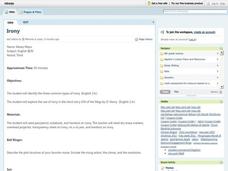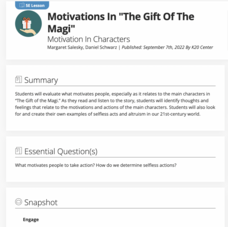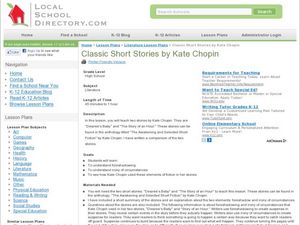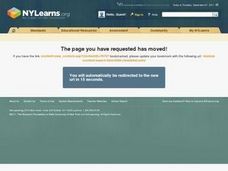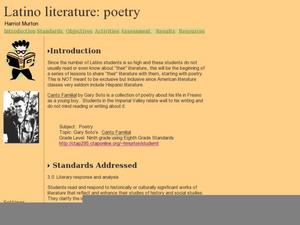Scholastic
Identifying Types of Irony Using "The Gift of the Magi"
O. Henry's "The Gift of the Magi" is the classic example of irony in literature. Teach young writers about the ways irony can engage their readers with an activity in which they write scripts using dramatic irony, situational irony, and...
Curated OER
Irony in Poetry and Prose (Fiction and Non-fiction Texts)
Middle and high schoolers examine the impact of irony in poetry and prose. In this figurative language lesson, they read instructor-selected literature and identify uses of irony. Then they discuss how irony enhances literature.
Curated OER
Analyzing the Use of Irony in a Short Story
Ninth graders examine how literature connects to real-life and see how irony aids in the development of theme. They read Shirley Jackson's The Lottery, and discuss elements of foreshadowing and situational irony. Then learners will write...
Curated OER
A Modest Proposal: Irony Made Understandable with Rock and Roll
Who doesn't love music? Poems and songs will engage your high school class in a discussion about irony. Use songs like "Rockin' in the Free World" or "Born in the U.S.A." to illustrate the ironic point of view. Print the lyrics so...
Curated OER
"Shooting An Elephant": George Orwell's Essay on His Life in Burma
High school readers examine George Orwell's essay "Shooting an Elephant" for examples of symbolism, metaphor, connotation, and irony. They analyze how these literary tools convey the writer's main point and contribute to the persuasive...
Curated OER
Analyzing Irony in Nonfiction
Students examine the use of irony in non-fiction works. In this literature lesson, students read non-fiction war texts and explore the use of irony in the piece as they respond to discussion questions.
Curated OER
Irony
What are the three types of irony? High schoolers engage in a lesson about the use of irony while reading O.Henry's short story "Gift of the Magi." They'll discuss rising action, climax, and resolution in the text before highlighting the...
Curated OER
Constructing Narrative from the Migrant Experience in Literature
Excerpts from John Steinbeck's The Grapes of Wrath and from John Fante's Ask the Dust, as well as a variety of primary source documents provide the background for an examination of the migrant experience from 1920-1945.
K20 LEARN
Motivations In "The Gift Of The Magi": Motivation In Characters
O. Henry's short story, "The Give of the Magi," launches a study of what motivates people to act as they do. Class members identify what they believe are the motivations of the characters in O. Henry's tale and then craft a one-page...
Curated OER
Foreshadowing and Situational Irony in Kate Chopin Short Stories
This resource contains summaries of the stories featured, but limited procedural detail. Readers compare Chopin's stories' use of situational irony and foreshadowing. High interest content (questionable paternity, missing persons) for...
Education Oasis
Creative Writing Unit: Analyzing, Interpreting, Discussing and Writing Various Genres of African-American Literature
A six-week unit takes high schoolers through various works of African-American literature, including poems, plays, and short stories. The lesson plan format includes a week-by-week description of activities, goals, materials, and...
Southern Nevada Regional Professional Development Program
Reading Literature - An Occurrence at Owl Creek Bridge
“An Occurrence at Owl Creek Bridge,” Ambrose Bierce’s short story, is used to model how structural moves, the decisions an author makes about setting, point of view, time order, etc., can be examined to reveal an author’s purpose. Groups...
Curated OER
Understanding Irony
Students discuss irony. In this language arts lesson plan, students identify irony and give examples of irony from their lives, a book, and current events. Students classify types of irony.
Curated OER
Literature: Satire in the American Dream
Eleventh graders examine cartoons for examples of satire, irony, and sarcasm. They write essays about cartoons, art work, or literature analyzing it for satirical elements. Finally, they create their own piece in one of the three areas...
Curated OER
Defending Great Literature
Students defend Mark Twain and the study of The Adventures of Huckleberry Finn using persuasive techniques, appropriate word choice, and correct letter format, in response to a fictional letter by an upset parent.
Curated OER
The Rest Cure: Gender in Medicine and Literature
Read and discuss "The Yellow Wall-Paper" and the gender issues that the story brings up. Use articles from the time period to analyze, complete with specific discussion questions. After two days, scholars write an essay based on topics...
Curated OER
"Shooting An Elephant": George Orwell's Essay on his Life in Burma
Students read an essay by George Orwell's life in Burma and place it in its cultural and historical context. They identify the main points of the essay and Orwell's use of symbolism in the essay. They explain how each persuasive tool...
Curated OER
Literature Review Paragraph
Tenth graders review the structural elements of a literary paragraph and organizational paragraph formats. They author a paragraph examining and reviewing a piece of literature currently being read in class. Students peer-review the...
Curated OER
Extreme Poetry Vocabulary
Challenge your class with this comprehensive list of literary vocabulary words. Learners take a pre-test, look up definitions, come up with an example, and then take a post-test. You might use this prior to a unit about poetic devices in...
PBS
Catch-22: What It Means to Be a(n Anti)Hero
Catch-22, Joseph Heller's send-up of military organizational bureaucracy, provides readers with an opportunity to consider the importance of the anti-hero. Class members fill out a worksheet comparing and contrasting the qualities of...
Curated OER
Latino Literature: Poetry
Under construction, this lesson focuses on Canto Familia, a collection of poetry about Gary Soto's experiences growing up in California's Imperial Valley. Representative of the experiences of many Latinos, the poems also address themes...
Curated OER
Irony At Owl Creek
Learners engage in study of literature in order to identify the use of irony in the context of reading two stories. They are compared and contrasted and the irony is exposed. The activities include the answering of several key questions.
Curated OER
Analyzing Literary Devices
Eighth graders identify figurative language and poetry in this literary analysis lesson. Using Through the Looking Glass by Lewis Carroll and a YouTube video for "The Walrus and the Carpenter," young readers complete a literary device...
Novelinks
The Little Prince: Concept/Vocab Analysis
Focus on the literary elements of Antoine de Saint-Exupéry's The Little Prince with a concept analysis sheet. With suggestions and explanations for many of the book's concepts, vocabulary, and other issues that may arise in instruction,...








